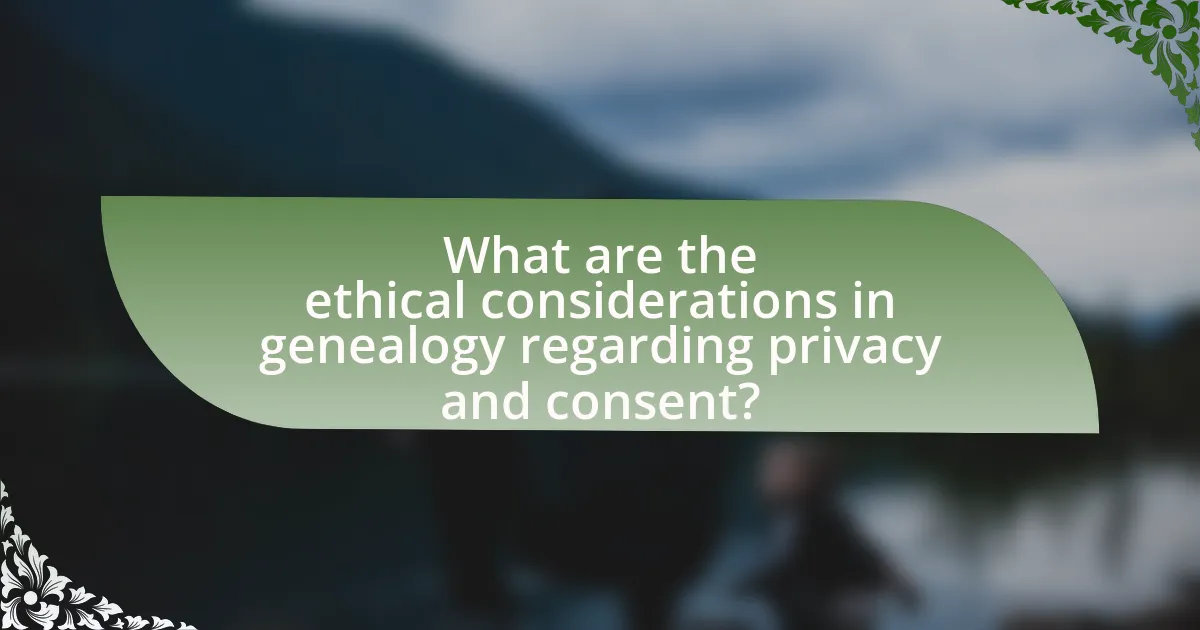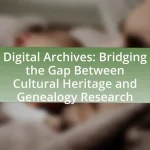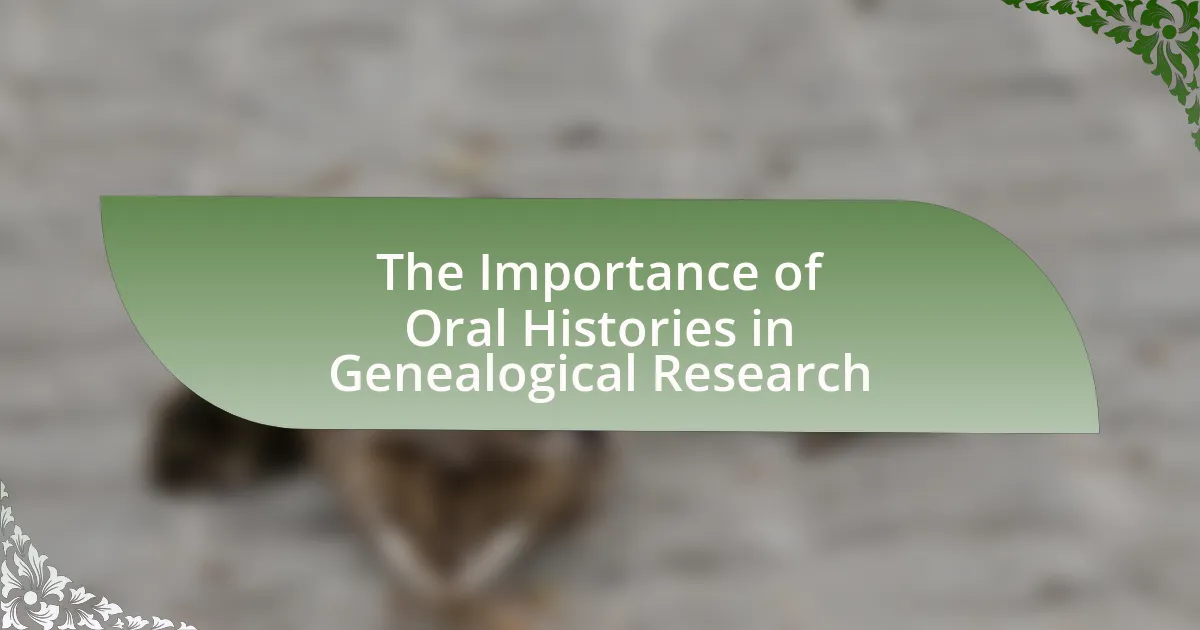The article focuses on the ethical considerations in genealogy, specifically addressing privacy and consent. It highlights the importance of protecting individuals’ personal information and obtaining informed consent before utilizing genetic data, particularly in light of sensitive familial connections that may arise from genealogical research. Key topics include the types of personal information involved, the impact of privacy breaches, the role of consent, and the legal frameworks governing these issues, such as the General Data Protection Regulation (GDPR) and the Health Insurance Portability and Accountability Act (HIPAA). Additionally, the article outlines best practices for genealogists to ensure ethical research while respecting privacy rights.
What are the ethical considerations in genealogy regarding privacy and consent?

Ethical considerations in genealogy regarding privacy and consent primarily involve the protection of individuals’ personal information and the necessity of obtaining informed consent before sharing or utilizing genetic data. Genealogical research often uncovers sensitive information about living relatives, which raises concerns about their privacy rights. For instance, the use of DNA testing services can reveal unexpected familial connections, potentially leading to emotional distress or familial conflict if individuals are not adequately informed or consenting to the use of their genetic data. Furthermore, legal frameworks, such as the Genetic Information Nondiscrimination Act (GINA) in the United States, emphasize the importance of consent and privacy in genetic testing, reinforcing the ethical obligation to respect individuals’ autonomy and confidentiality in genealogical practices.
Why is privacy important in genealogy research?
Privacy is important in genealogy research because it protects individuals’ personal information and respects their autonomy. Maintaining privacy ensures that sensitive data, such as health records or family secrets, is not disclosed without consent, which can prevent emotional distress and potential misuse of information. Ethical guidelines in genealogy emphasize the need for informed consent, as highlighted by organizations like the National Genealogical Society, which advocates for the responsible handling of personal data to uphold trust and integrity in research practices.
What types of personal information are typically involved in genealogy?
Genealogy typically involves various types of personal information, including names, dates of birth, marriage, and death, as well as locations associated with these events. This information is essential for constructing family trees and understanding lineage. Additionally, genealogical research may include details such as occupation, education, and even health history, which can provide context about ancestors’ lives. The collection and use of this personal information raise ethical considerations regarding privacy and consent, as individuals may not have authorized the sharing of their data or that of their relatives.
How can privacy breaches impact individuals and families?
Privacy breaches can significantly impact individuals and families by exposing sensitive personal information, leading to emotional distress, financial loss, and erosion of trust. When personal data is compromised, individuals may experience anxiety and fear regarding their safety and privacy, which can strain familial relationships. Additionally, financial repercussions can arise from identity theft or fraud, with the Federal Trade Commission reporting that in 2020, consumers lost over $3.3 billion to fraud, often linked to privacy violations. Furthermore, the breach of privacy can lead to a loss of trust in institutions and family members, complicating social dynamics and creating long-term psychological effects.
What role does consent play in genealogy?
Consent is crucial in genealogy as it ensures that individuals have the right to control the use of their personal and familial information. This control is essential for respecting privacy and maintaining ethical standards in genealogical research. For instance, many genealogical organizations and databases require explicit consent from living individuals before including their data, which aligns with privacy laws such as the General Data Protection Regulation (GDPR) in Europe. This regulation mandates that personal data can only be processed if consent is obtained, thereby reinforcing the importance of consent in genealogical practices.
How is consent defined in the context of genealogy?
Consent in the context of genealogy is defined as the explicit permission granted by individuals for the collection, use, and sharing of their personal genetic and familial information. This definition emphasizes the importance of respecting individuals’ rights to control their own data, particularly in light of privacy concerns and the potential for misuse of genetic information. Ethical guidelines in genealogy stress that obtaining informed consent is crucial, as it ensures that individuals understand how their information will be used and the implications of sharing it, thereby fostering trust and transparency in genealogical research practices.
What are the challenges in obtaining consent from living relatives?
Obtaining consent from living relatives presents several challenges, primarily due to emotional dynamics, varying levels of understanding about the consent process, and differing opinions on privacy. Emotional dynamics can complicate discussions, as relatives may have differing feelings about sharing personal information or may be grieving, which can affect their willingness to engage. Additionally, some relatives may not fully understand what they are consenting to, leading to confusion or reluctance to provide consent. Furthermore, differing opinions on privacy can create conflict; some individuals may prioritize personal privacy over genealogical research, making it difficult to reach a consensus. These factors collectively hinder the process of obtaining informed consent from living relatives in genealogical contexts.
What legal frameworks govern privacy and consent in genealogy?
Legal frameworks governing privacy and consent in genealogy primarily include data protection laws such as the General Data Protection Regulation (GDPR) in the European Union and the Health Insurance Portability and Accountability Act (HIPAA) in the United States. GDPR mandates that individuals have the right to control their personal data, requiring explicit consent for processing genetic information, while HIPAA protects the privacy of health information, including genetic data, ensuring that consent is obtained before sharing such information. These regulations establish the legal basis for how genealogical data can be collected, used, and shared, emphasizing the importance of informed consent and individual privacy rights.
What laws protect personal data in genealogy research?
Laws that protect personal data in genealogy research include the General Data Protection Regulation (GDPR) in the European Union and the Health Insurance Portability and Accountability Act (HIPAA) in the United States. GDPR mandates that personal data must be processed lawfully, transparently, and for specific purposes, giving individuals rights over their data, including access and deletion. HIPAA protects the privacy of individuals’ health information, which can be relevant in genealogy when researching medical histories. Both laws emphasize the importance of consent and the ethical handling of personal data in research contexts.
How do these laws vary across different countries?
Laws regarding privacy and consent in genealogy vary significantly across different countries. For instance, in the United States, genealogical research is largely governed by state laws, which can differ widely; some states have robust privacy protections while others have more lenient regulations. In contrast, the European Union enforces strict data protection laws under the General Data Protection Regulation (GDPR), which mandates explicit consent for processing personal data, including genealogical information. Additionally, countries like Canada have their own privacy laws that emphasize individual consent and the protection of personal information. These variations reflect differing cultural attitudes towards privacy and the handling of personal data in genealogical research.
How can genealogists ensure ethical practices in their research?
Genealogists can ensure ethical practices in their research by obtaining informed consent from living individuals before sharing their personal information. This practice respects privacy and upholds the ethical standards set by organizations such as the Association of Professional Genealogists, which emphasizes the importance of consent in genealogical research. Additionally, genealogists should be aware of and comply with relevant data protection laws, such as the General Data Protection Regulation (GDPR) in Europe, which mandates strict guidelines on handling personal data. By adhering to these principles, genealogists can maintain ethical integrity while conducting their research.
What best practices should genealogists follow to respect privacy?
Genealogists should prioritize obtaining consent from living individuals before sharing their personal information. This practice is essential to respect privacy and maintain ethical standards in genealogy. Additionally, genealogists should be aware of local laws regarding data protection and privacy, such as the General Data Protection Regulation (GDPR) in Europe, which mandates explicit consent for processing personal data. Furthermore, genealogists should anonymize sensitive information when publishing research to protect the identities of living relatives. By following these best practices, genealogists can ensure they respect the privacy of individuals while conducting their research.
How can genealogists effectively communicate with family members about consent?
Genealogists can effectively communicate with family members about consent by initiating open and transparent discussions regarding the sharing of personal information. This approach fosters trust and ensures that family members understand the importance of consent in genealogical research, particularly in relation to privacy concerns. Providing clear explanations about how the information will be used, who will have access to it, and the potential implications of sharing personal data can further enhance understanding. Research indicates that clear communication about privacy and consent can lead to higher levels of family engagement and cooperation in genealogical projects.
What are the implications of sharing genealogical data publicly?
Sharing genealogical data publicly can lead to significant privacy concerns and ethical dilemmas. When individuals share their genealogical information, they may inadvertently expose sensitive personal data about themselves and their relatives, which can be misused by third parties. For instance, the release of such data can facilitate identity theft, discrimination, or unwanted contact from distant relatives or strangers. Additionally, the lack of informed consent from family members regarding the sharing of their personal information raises ethical questions about autonomy and respect for privacy. Research indicates that many individuals are unaware of the potential risks associated with publicly accessible genealogical data, highlighting the need for greater awareness and protective measures in genealogical research practices.
How does public sharing affect individual privacy rights?
Public sharing significantly undermines individual privacy rights by exposing personal information to a wide audience without consent. When individuals share genealogical data publicly, they often inadvertently disclose sensitive information about themselves and their relatives, which can lead to identity theft, discrimination, or unwanted contact. Research indicates that 60% of individuals are unaware of the privacy implications of sharing their genetic information online, highlighting a gap in understanding the risks involved. Furthermore, legal frameworks like the General Data Protection Regulation (GDPR) emphasize the importance of consent and the right to privacy, illustrating that public sharing can conflict with established privacy rights.
What are the potential risks of using online genealogy platforms?
The potential risks of using online genealogy platforms include privacy breaches, data misuse, and inaccuracies in family history information. Privacy breaches can occur when personal data is shared without consent, exposing sensitive information to unauthorized individuals. Data misuse may arise if platforms sell or share user information with third parties, leading to unwanted solicitations or identity theft. Additionally, inaccuracies in family history can result from user-generated content, which may not be verified, potentially leading to false conclusions about lineage and heritage. These risks highlight the importance of understanding privacy policies and the need for informed consent when using such platforms.
What tools and resources are available for ethical genealogy research?
Ethical genealogy research utilizes various tools and resources to ensure respect for privacy and consent. Key resources include genealogical databases like Ancestry.com and FamilySearch, which provide access to historical records while emphasizing user privacy policies. Additionally, ethical guidelines from organizations such as the Association of Professional Genealogists outline best practices for obtaining consent and protecting sensitive information. Furthermore, educational resources like webinars and workshops on ethical research practices help genealogists navigate privacy concerns effectively. These tools and resources collectively support responsible genealogy research that honors individual privacy rights.
What guidelines do professional organizations provide for ethical practices?
Professional organizations provide guidelines for ethical practices that emphasize the importance of privacy, consent, and accuracy in genealogy. These guidelines typically include obtaining informed consent from individuals before sharing their personal information, ensuring the confidentiality of sensitive data, and accurately representing genealogical findings to avoid misleading others. For instance, the Association of Professional Genealogists (APG) advocates for the ethical treatment of clients and subjects, highlighting the necessity of transparency and respect for privacy in genealogical research.
How can genealogists educate themselves on privacy and consent issues?
Genealogists can educate themselves on privacy and consent issues by engaging with relevant literature, attending workshops, and participating in professional organizations focused on ethical practices. Resources such as the “Genealogical Proof Standard” and guidelines from the Association of Professional Genealogists provide foundational knowledge on respecting individual privacy and obtaining consent for sharing personal information. Additionally, genealogists can stay informed about legal regulations, such as the General Data Protection Regulation (GDPR) in Europe, which outlines data protection and privacy rights. Engaging with case studies and discussions in forums dedicated to genealogy ethics further enhances understanding of these critical issues.
What practical tips can genealogists follow to navigate privacy and consent issues?
Genealogists can navigate privacy and consent issues by obtaining explicit consent from living individuals before sharing their personal information. This practice is essential to respect privacy rights and comply with data protection laws, such as the General Data Protection Regulation (GDPR) in Europe, which mandates that personal data must be processed lawfully, transparently, and for specific purposes. Additionally, genealogists should be aware of the varying privacy laws across different jurisdictions, as these can impact how they collect and share genealogical data. By implementing these strategies, genealogists can ethically manage sensitive information while fostering trust with individuals whose data they are researching.




